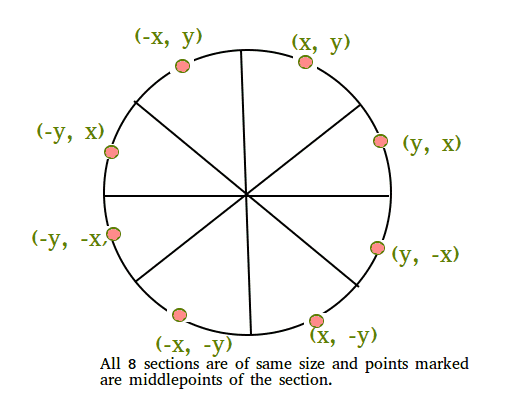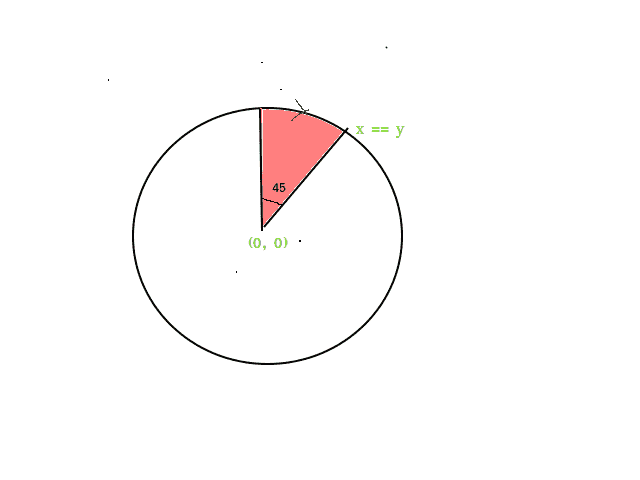给定圆心及其半径。我们的任务是找到离散圆上任意点的邻域。 例如:
Input : Center = (0, 0), Radius = 3 Point for determining neighbors = (2, 2)Output : Neighbors of given point are : (1, 3), (3, 1)Input : Center = (2, 2) Radius 2 Point of determining neighbors = (0, 2)Output : Neighbors of given point are : (1, 4), (3, 4)
离散圆上任何点的邻域都是从其原始x坐标中减去一个或多个x坐标的点。
我们使用 bresenham圆生成算法 提取出在计算机屏幕上画一个像素圆所需的整数点。

圆具有高度对称的特性,这是在计算机像素屏幕上绘制圆所必需的。Bresenham的圆算法计算前45度内像素的位置,并使用圆的8向对称特性计算以原点为中心的圆外围的剩余像素。

求导:考虑一个无穷小的连续圆弧,如下图所示,假设我们要沿中心的原点顺时针圆弧运动,半径R和我们的运动位于第一个八角体中,在第一个八分体上,所以我们的极限是(0,r)到(r/)。 ![]() ,r/
,r/ ![]() )其中x=y。正如我们所知,在这个特定的八分之一点中,y坐标的减少小于x坐标的增加,或者你可以说,沿x轴的运动大于沿y轴的运动,所以,x坐标总是在第一个八分之一点增加。现在,我们想知道y是否会随x变化。为了知道y随x的变化,bresenham引入了一个名为decision parameter的变量,该变量将在循环运行时更新其值。 现在,我们需要了解,我们将如何选择下一个像素,在图中,f(N)和f(S)分别是计算从原点到像素N和S的距离所涉及的误差,取较小值,我们将选择该像素。判定参数定义为d=f(N)+f(S),如果d<=0,则N将是下一个像素,否则S将是下一个像素。我们将继续这样做,直到x
)其中x=y。正如我们所知,在这个特定的八分之一点中,y坐标的减少小于x坐标的增加,或者你可以说,沿x轴的运动大于沿y轴的运动,所以,x坐标总是在第一个八分之一点增加。现在,我们想知道y是否会随x变化。为了知道y随x的变化,bresenham引入了一个名为decision parameter的变量,该变量将在循环运行时更新其值。 现在,我们需要了解,我们将如何选择下一个像素,在图中,f(N)和f(S)分别是计算从原点到像素N和S的距离所涉及的误差,取较小值,我们将选择该像素。判定参数定义为d=f(N)+f(S),如果d<=0,则N将是下一个像素,否则S将是下一个像素。我们将继续这样做,直到x
CPP
// C++ program to find neighbors of a given point on circle #include <bits/stdc++.h> using namespace std; // map to store all the pixels of circle map< int , list< int > > mymap; map< int , list< int > >::iterator it; // This program will print all the stored pixels. void showallpoints(map< int , list< int > >& mymap) { // To print out all the stored pixels, // we will traverse the map using iterator for (it = mymap.begin(); it != mymap.end(); it++) { // List contains all the y-coordinate. list< int > temp = it->second; for ( auto p = temp.begin(); p != temp.end(); p++) { cout << "(" << it->first << ", " << *p << ")" ; } } } // This function will stored the pixels. void putpixelone( int m, int n, map< int , list< int > >& mymap) { // check if the given pixel is present already in the // map then discard that pixel and return the function. map< int , list< int > >::iterator it; // if x-coordinate of the pixel is present in the map then // it will give iterator pointing to list of those pixels // which are having same x-coordinate as the input pixel if (mymap.find(m) != mymap.end()) { it = mymap.find(m); list< int > temp = it->second; list< int >::iterator p; // Checking for y coordinate for (p = temp.begin(); p != temp.end(); p++) if (*p == n) return ; // if map doesn't contain pixels having same y- // coordinate then pixel are different and store // the pixel mymap[m].push_back(n); } else // Neither x nor y coordinate are same. // put the pixel into the map mymap[m].push_back(n); return ; } // generate all the pixels using 8 way-symmetry of circle void putpixelall( int p, int q, int x1, int y1) { putpixelone(p + x1, q + y1, mymap); putpixelone(q + x1, p + y1, mymap); putpixelone(q + x1, -p + y1, mymap); putpixelone(p + x1, -q + y1, mymap); putpixelone(-p + x1, -q + y1, mymap); putpixelone(-q + x1, -p + y1, mymap); putpixelone(-q + x1, p + y1, mymap); putpixelone(-p + x1, q + y1, mymap); return ; } // Brensenham's circle algorithm void circle( int centerx, int centery, int r) { // initial coordinate will be (0, radius) and we // will move counter-clockwise from this coordinate int x = 0; int y = r; // decision parameter for initial coordinate float decision_para = 3 - 2 * (r); putpixelall(x, y, centerx, centery); while (x < y) { // x will always increase by 1 unit x = x + 1; if (decision_para <= 0) { // if decision parameter is negative then N // will be next pixel N(x+1, y) decision_para = decision_para + 4 * x + 6; } else { // if decision parameter is positive then N // will be next pixel S(x+1, y-1) y = y - 1; decision_para = decision_para + 4 * (x - y) + 10; } // Function call to generate all the pixels by symmetry putpixelall(x, y, centerx, centery); } return ; } // this program will find the neighbors of a given point` void neighbours(map< int , list< int > >& mymap, int given_pointx, int given_pointy) { for (it = mymap.begin(); it != mymap.end(); ++it) { if (it->first == given_pointx + 1 || it->first == given_pointx - 1) { list< int > temp1 = it->second; list< int >::iterator itr1; for (itr1 = temp1.begin(); itr1 != temp1.end(); ++itr1) { // Checking for same-sign. if (given_pointy >= 0 && *itr1 >= 0) cout << "(" << it->first << ", " << *itr1 << ")" ; else if (given_pointy <= 0 && *itr1 <= 0) cout << "(" << it->first << ", " << *itr1 << ")" ; else continue ; } } } } // Driver code int main() { int center_x = 0, center_y = 0; float r = 3.0; circle(center_x, center_y, r); showallpoints(mymap); int nx = 3, ny = 0; neighbours(mymap, nx, ny); cout << endl; return 0; } |
输出:
(-3, 0), (-3, -1), (-3, 1), (-2, -2), (-2, 2), (-1, -3), (-1, 3), (0, 3)(0, -3), (1, 3), (1, -3), (2, 2), (2, -2), (3, 0), (3, 1), (3, -1) Neighbours of given point are : (2, 2), (2, -2)
参考资料: https://www.slideshare.net/tahersb/bresenham-circle 本文由 刺耳的库马尔·辛格 .如果你喜欢GeekSforgek,并想贡献自己的力量,你也可以使用 写极客。组织 或者把你的文章寄去评论-team@geeksforgeeks.org.看到你的文章出现在Geeksforgeks主页上,并帮助其他极客。 如果您发现任何不正确的地方,或者您想分享有关上述主题的更多信息,请写下评论。


![关于”PostgreSQL错误:关系[表]不存在“问题的原因和解决方案-yiteyi-C++库](https://www.yiteyi.com/wp-content/themes/zibll/img/thumbnail.svg)



